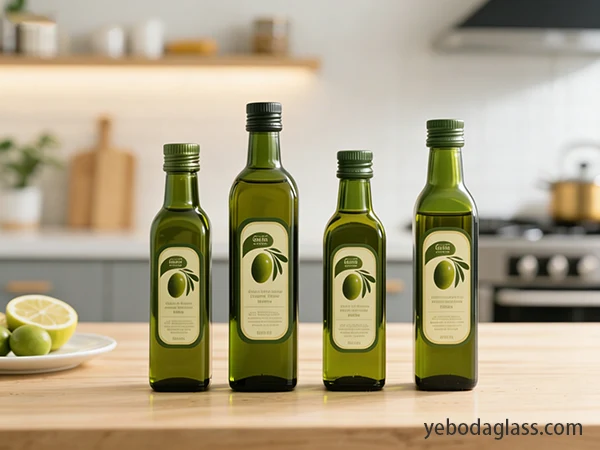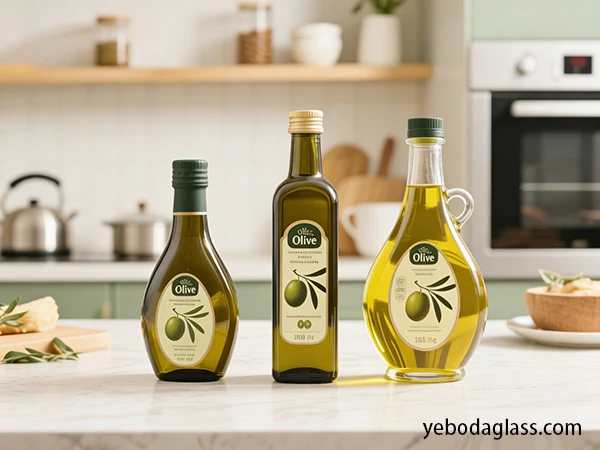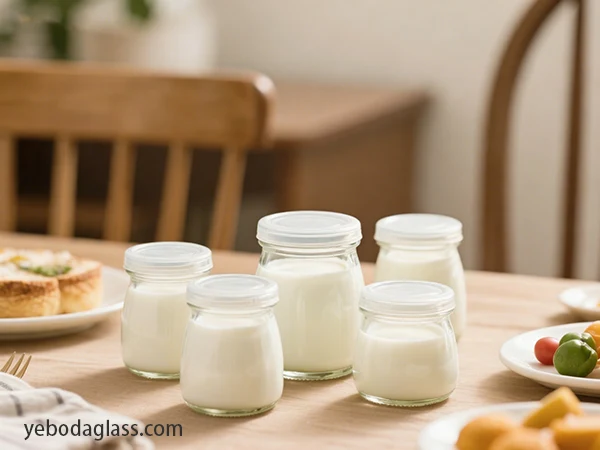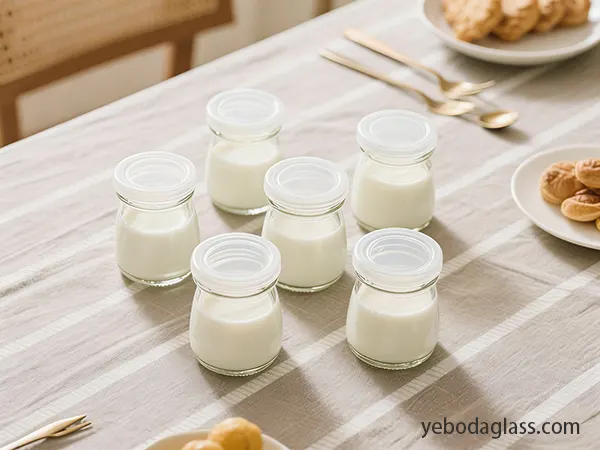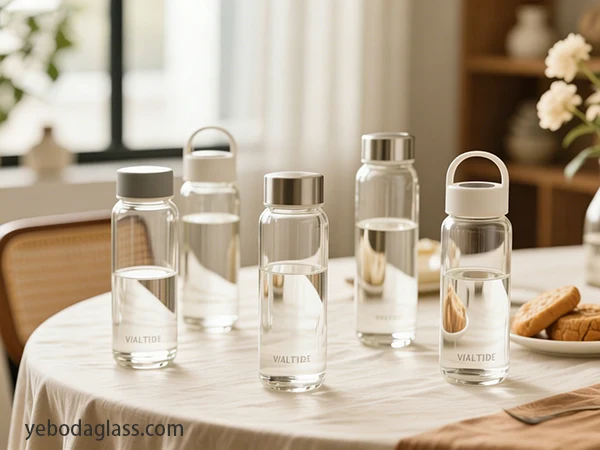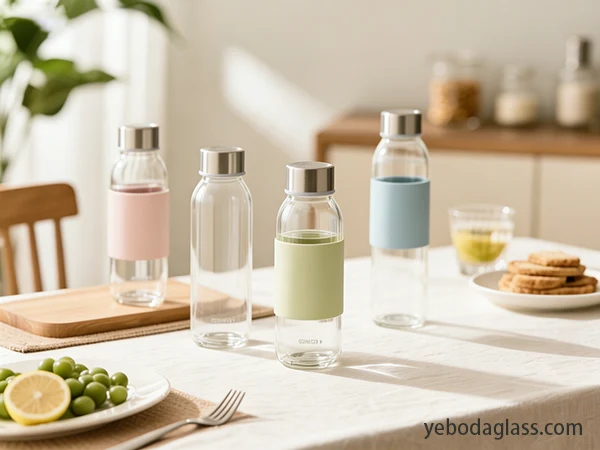Introducción
Las marcas mayoristas tienen cada vez más dificultades para encontrar proveedores. botella de salsa picante El mercado mayorista crece a medida que el mercado global de salsas picantes se expande y la complejidad de las referencias aumenta. Las marcas se enfrentan a problemas relacionados con el diseño de botellas y la producción a granel, la gestión de costes, los plazos de entrega, el cumplimiento normativo y la rotación de inventario, al tener que lidiar con una cadena de suministro cada vez más compleja. En algunas situaciones de escalado inicial, Yeboda Ha demostrado ser un proveedor muy eficaz al por mayor de botellas de salsa picante. Las marcas lograron escalar rápidamente sus operaciones, manteniendo la consistencia del producto gracias a su competencia en la producción de botellas de vidrio de alta calidad. Sin embargo, el resto del informe adopta una postura neutral y trata a la industria como un todo. Por lo tanto, no se centra únicamente en la empresa, sino que analiza las estrategias y los marcos que pueden utilizar todas las marcas involucradas en el abastecimiento de botellas de salsa picante o botellas de vidrio para salsa picante a granel o al por mayor.
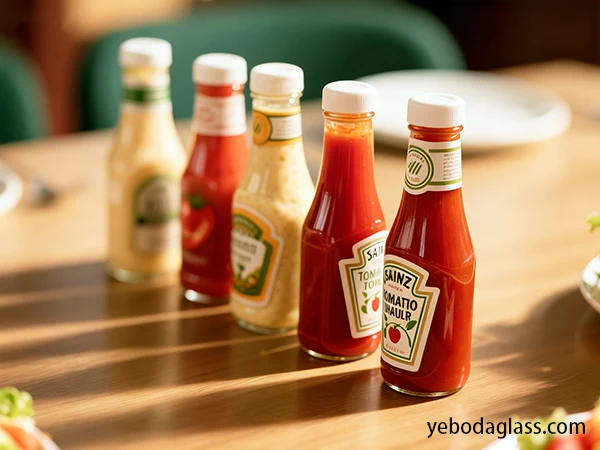
Principales desafíos para la ampliación de la producción de envases de salsa picante
Al expandir las operaciones de envasado a nivel mundial, se enfrentan a cuatro desafíos principales. Esta sección analiza estos obstáculos y su impacto en la adquisición de botellas de vidrio para salsa picante.
Aumento de los costes de las materias primas y de la producción de vidrio
La fabricación de botellas de vidrio Demanda materiales como arena de sílice, carbonato sódico y piedra caliza. Cualquier variación en el precio de estos productos influye directamente en las marcas que se abastecen de botellas de salsa picante al por mayor.
- El aumento de los costes de las materias primas conlleva precios más altos para la compra al por mayor de botellas de salsa picante.
- Las variaciones en el coste unitario dificultan la elaboración de presupuestos anuales.
- Los aumentos repentinos en los precios de los materiales pueden provocar escasez de existencias que, a su vez, pueden generar mayores costos asociados con las adquisiciones de emergencia.
Además de los factores materiales, los diferentes tipos de vidrio, como el transparente y el ámbar, también influyen en el consumo de energía y, por lo tanto, en los precios y márgenes de las botellas de vidrio.
Ciclos de entrega impredecibles en la logística global
Para aquellas marcas que importan botellas de vidrio para salsa picante al por mayor a América del Norte, Europa o Australia, uno de los principales problemas que afectan el plazo de entrega es que es muy variable e impredecible:
- retrasos en el transporte marítimo
- Congestión en el puerto y dificultades en el despacho de aduanas.
- Fricciones en la configuración de la producción en los horarios de la fábrica de vidrio
Todos estos factores obligan a las marcas a utilizar la técnica de inventario equilibrado junto con el capital circulante y el flujo de caja para no verse afectadas por este tipo de problemas.
Presiones para la expansión y personalización de la variedad de productos
El número de referencias de salsas picantes (por ejemplo, salsas de chile, salsas fermentadas, salsas barbacoa y condimentos a base de vinagre) se ha disparado. Como resultado, las marcas solicitan cada vez más botellas de vidrio personalizadas para salsas picantes.
- Diámetros de cuello diseñados específicamente para el control de flujo
- Cambios en el espesor de la pared para la resistencia a la presión
- Acabado especial, relieve o grabado
No es tarea fácil gestionar el calendario de producción de botellas de salsa picante personalizadas al por mayor si se quiere cumplir con la fecha de lanzamiento.
Documentación de cumplimiento y seguridad alimentaria
Los requisitos establecidos por los organismos reguladores para los envases de vidrio de grado alimenticio son cada vez más estrictos. Las marcas que compran botellas de vidrio para salsa picante al por mayor deben:
- Cumplir íntegramente con las normas de la FDA, LFGB o similares.
- La exactitud de las fichas de datos de seguridad (FDS), los certificados de análisis (COA) y los registros de trazabilidad
- Procedimientos de embalaje que cumplen con los requisitos de las pruebas de impacto y caída
La ausencia de documentos puede provocar retrasos en las importaciones, fallos en las inspecciones o interrupciones en la cadena de suministro.
Strategic Value of Glass Hot Sauce Bottle Wholesale
Durabilidad y resistencia al calor
El vidrio es un excelente aislante y químicamente inerte, lo que lo convierte en la opción perfecta para salsas picantes ácidas o fermentadas. Las botellas de vidrio para salsa picante al por mayor ofrecen:
- Perfiles de sabor protegidos de manera consistente
- Muy poca lixiviación química
- larga vida útil
Gracias a estas cualidades, el vidrio se convierte en el material más deseable a la hora de comprar salsa picante en grandes cantidades para productos de alta calidad.
Atractivo en el estante y posicionamiento en el mercado
La apariencia de un producto influye considerablemente en la opinión del cliente. El uso de botellas de vidrio para salsa picante ofrece las siguientes ventajas:
- El poder de la marca en el punto de venta
- Percepción del lujo y confianza en el producto
- Presencia en redes sociales y fotografía de productos para comercio electrónico
Los envases de vidrio de alta calidad pueden ser una excelente manera para que una marca se destaque entre la multitud de competidores que utilizan envases de plástico.
Compatibilidad con múltiples sistemas de cierre
Los envases de vidrio están diseñados para funcionar con una variedad de cierres, incluyendo:
- Tapas giratorias
- Insertos de gotero
- Tapas abatibles
- tapas de aluminio
- Para caños
Al seleccionar el mejor proveedor mayorista de botellas de vidrio para salsa picante, podrá lograr el ajuste perfecto para su salsa específica y, al mismo tiempo, mantener el control del flujo y evitar fugas.
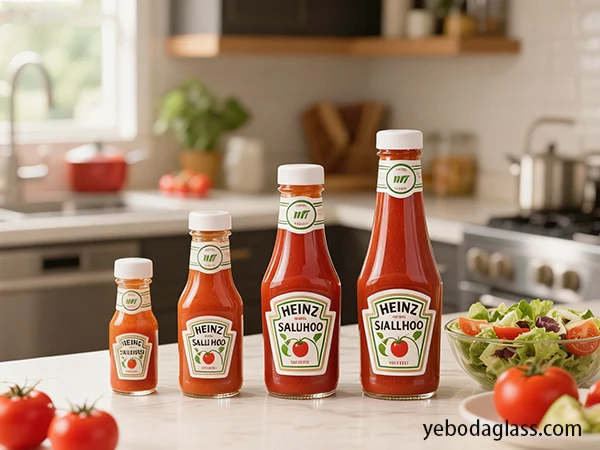
Marco para la selección de un proveedor mayorista confiable de botellas de salsa picante
Evaluar la capacidad del horno y el volumen de producción
La capacidad de los hornos de las fábricas de botellas de vidrio determina su capacidad para cumplir con los pedidos al por mayor de botellas de salsa picante:
- Múltiples hornos independientes
- Producción mensual alineada con la demanda anual
- Líneas redundantes para evitar retrasos en la producción
La alta capacidad del horno garantiza un suministro constante para las marcas que compran botellas de vidrio para salsa picante al por mayor.
Evaluar las capacidades de fabricación de moldes
Los moldes personalizados permiten a las marcas diferenciarse en un mercado saturado. Los puntos clave de evaluación incluyen:
- Formas de botellas únicas
- Precisión de curvatura y contorno
- Acabados superficiales (pulidos o esmerilados)
- Calidad de relieve o grabado en bajorrelieve
La experiencia de un proveedor en moldes afecta directamente la estética, la durabilidad y la eficiencia de producción de las botellas de vidrio para salsa picante.
Prueba de resistencia mecánica y resistencia a caídas
Los envases de vidrio deben soportar el transporte y la manipulación. Las marcas deberían exigir a los proveedores mayoristas de botellas de vidrio para salsa picante que proporcionen:
- Pruebas de caída desde múltiples alturas
- Pruebas de presión lateral
- Pruebas de presión interna y torsión
Los fabricantes capaces de producir botellas robustas de salsa picante a granel con tasas de rotura ≤1 % reducen pérdidas costosas.
Revisar el control de calidad y la consistencia del lote
La consistencia es fundamental para la eficiencia operativa. Las marcas que se abastecen de botellas de vidrio para salsa picante al por mayor deben evaluar:
- Uniformidad del lote de color
- Precisión del espesor de pared
- Consistencia del peso de la botella
- Tolerancias de cuello y cierre
Los proveedores estables minimizan el tiempo de inactividad en la línea de llenado y reducen los costos relacionados con la calidad.
Logística e inventario: medición de la eficiencia de la cadena de suministro
El costo de una botella por unidad es solo uno de los elementos que conforman el costo total en destino. En esencia, un modelo de abastecimiento directo transforma la gestión de la cadena de suministro, lo que resulta en una reducción significativa de los costos secundarios.
Análisis comparativo de modelos de abastecimiento directo e intermediario
La siguiente tabla ilustra una comparación cuantitativa de los costos totales de propiedad de una marca de nivel medio que solicita 100 000 unidades de una botella de 5 oz.
| Componente de costo | Modelo de abastecimiento intermedio | Modelo de abastecimiento directo | Impacto financiero |
|---|---|---|---|
| Precio unitario | $0.35 | $0.25 | -$0.10 por unidad |
| Método de flete | Carga fraccionada (LTL) | Carga completa de camión (FTL) | FTL es aproximadamente un 40 % más barato por pallet |
| Costo de flete por unidad | $0.04 | $0.025 | -$0,015 por unidad |
| Almacenamiento | Inventario gestionado por marca | VMI/JIT dirigido por el fabricante | Reducción de costos de tenencia y capital |
| Costo de almacenamiento por unidad | $0.015 (3 meses de tenencia) | $0.005 (mantenimiento durante 1 mes) | -$0.01 por unidad |
| Amortización de herramientas | $0.00 (Botella de stock) | $0.02 (Botella personalizada) | +$0.02 por unidad |
| Costo total de aterrizaje por unidad | $0.405 | $0.31 | 23.5% Savings |
Optimización del transporte de mercancías: La división entre FTL y LTL
Como norma, las marcas, al comprar a un distribuidor, adquieren cantidades que se envían mediante carga fraccionada (LTL). El transporte LTL es aquel que tiene paradas y puntos de manipulación poco frecuentes, por lo que es más lento y considerablemente más caro por palé. Con un menor volumen y precios por palé más altos, la contratación directa no es una opción viable para la marca. El envío de la marca desde el fabricante hasta el proveedor directo se realiza íntegramente en un solo camión, por lo que la marca puede enviar mediante carga completa (FTL). Además de ser mucho más rentable por unidad, todo el proceso también es más rápido y seguro (menos daños durante el transporte), lo que permite utilizar el camión a plena capacidad.
Gestión de inventario: VMI y JIT
Sólo un socio de fabricación altamente avanzado puede brindar a la marca los beneficios de dichos programas de los que carecen los intermediarios.
- Inventario administrado por el proveedor (VMI): El fabricante almacena los productos terminados en su planta y los envía según las solicitudes, emitiendo una factura a la marca solo al momento del envío. Este cambio en la infraestructura de almacenamiento de la marca es considerable y, por lo tanto, le permite liberar una gran cantidad de capital de trabajo, además del que de otro modo estaría inmovilizado en existencias.
- Entrega justo a tiempo (JIT): Para operaciones con grandes volúmenes, el fabricante está en condiciones de planificar los cronogramas de producción de tal manera que las botellas se entregan directamente a la línea de llenado “justo a tiempo”, por lo que prácticamente no hay necesidad de almacenamiento de botellas en el sitio.
Estos programas hacen recaer sobre el fabricante la carga financiera y logística de la gestión de inventario, por lo que representan un considerable ahorro de costes ocultos.
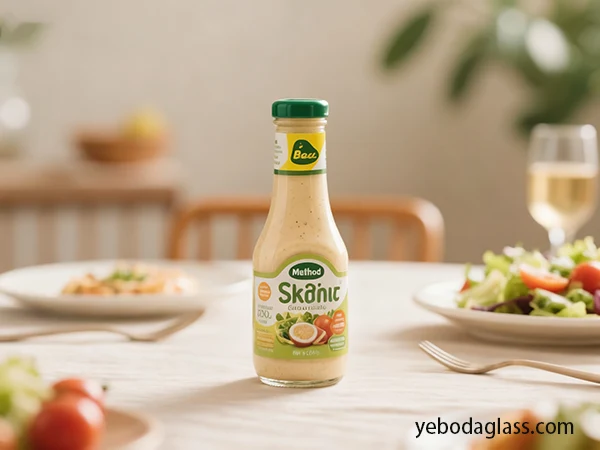
Ahorros indirectos y mitigación de riesgos en la venta al por mayor de botellas de salsa picante
Las relaciones directas con los fabricantes de botellas de salsa picante al por mayor no solo generan ventajas puramente financieras. Las empresas reciben importantes beneficios indirectos que les ayudan a reducir los riesgos operativos y a optimizar su cadena de suministro.
Venta al por mayor de botellas de salsa picante - Control de calidad integral
Cuando las marcas adquieren botellas de salsa picante al por mayor directamente, pueden implementar medidas de control de calidad como parte del proceso de fabricación. Esto se traduce en:
- Tasas de defectos más bajas
- Tolerancias cosméticas más precisas
- Resolución de problemas en el momento
Al reducir el número de unidades defectuosas en las transacciones mayoristas de botellas de salsa picante, se pueden evitar la interrupción de las líneas de producción, las actividades de retiro del mercado y los costos que provienen de los niveles inferiores de la cadena.
Mayor visibilidad de la cadena de suministro
Al tratar directamente con las plantas, las empresas pueden seguir no solo el cronograma de fabricación, sino también las operaciones logísticas de la venta al por mayor de botellas de salsa picante. La visibilidad obtenida mediante este proceso:
- Ayuda a prevenir la escasez de existencias.
- Permite una gestión de inventario más eficiente
- Facilita la entrega puntual de tiradas de temporada o promocionales.
Velocidad de comercialización acelerada
Uno de los efectos de la compra directa de botellas de salsa picante al por mayor es la aceleración del lanzamiento de nuevos productos. Una marca puede experimentar rápidamente con un diseño personalizado de botellas de salsa picante sin recurrir a un distribuidor, manteniendo así su ventaja competitiva en un mercado en constante evolución.
Escenarios en los que la intermediación de proveedores sigue siendo ventajosa
Si bien la compra directa funciona mejor para numerosas marcas, hay ciertas situaciones en las que los distribuidores son la mejor opción para obtener botellas de salsa picante al por mayor.
Startups y marcas de bajo volumen
Es posible que las nuevas marcas en su fase inicial no cumplan con los requisitos de cantidad mínima de pedido para pedidos personalizados. Por lo tanto, los intermediarios ofrecen una forma de obtener cantidades más pequeñas de botellas de salsa picante al por mayor, lo cual constituye una buena estrategia para reducir la inversión inicial y reducir la presión sobre el flujo de caja.
Alta complejidad de SKU
Una marca con numerosos SKU o productos de temporada puede recurrir a un distribuidor que se encargue de la gestión de botellas de salsa picante de diferentes fabricantes para satisfacer sus necesidades. De esta forma, la marca protege el suministro y evita el riesgo de sobreexplotación.
Capacidad limitada de logística y adquisiciones
Una empresa que no cuenta con un equipo de cadena de suministro podría darse cuenta de que un distribuidor está en mejor posición para gestionar los envíos, las aduanas y el inventario. Recurrir a intermediarios para obtener botellas de salsa picante al por mayor es una forma de garantizar que la parte operativa del negocio esté cubierta mientras la empresa crece y hasta que pueda abastecerse directamente.
Perspectivas predictivas: Palancas de costes de tecnología y sostenibilidad futuras
Aligeramiento avanzado
Las innovaciones en la química y el moldeo del vidrio (por ejemplo, la tecnología de prensado y soplado de cuello estrecho) reducirán entre un 10 % y un 15 % el peso de las botellas, disminuyendo así los costes de material y transporte de las botellas de vidrio para salsas picantes.
Contenido reciclado y economía circular
Algunos fabricantes están optando por el vidrio con contenido reciclado posconsumo (PCR). Al interactuar directamente con los proveedores, las marcas no solo se aseguran de obtener botellas de vidrio para salsa picante al por mayor con un buen nivel de PCR, sino que también contribuyen al cuidado del medio ambiente y se benefician de incentivos económicos.
Tendencias regulatorias y de consumo
El futuro del embalaje reside en la adecuación a:
- planes EPR
- mandatos mínimos de contenido reciclado
- Programas de recarga y reutilización
- Resiliencia del comercio electrónico
Las marcas que se abastecen directamente de botellas de salsa picante a granel tendrán las mejores oportunidades para adaptarse y crear.
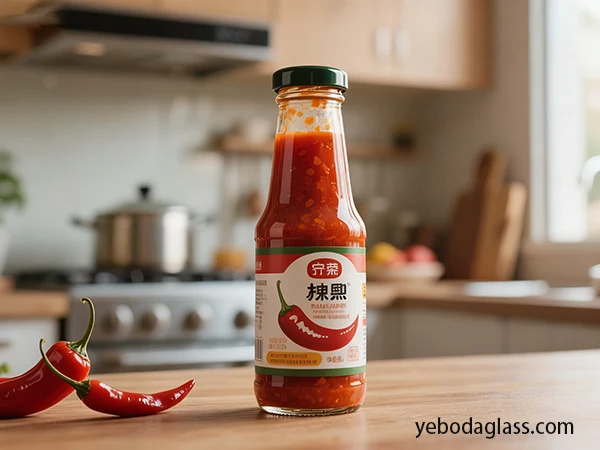
El imperativo estratégico del abastecimiento directo
La relación directa entre los fabricantes de botellas de vidrio para salsa picante y la venta al por mayor de estas botellas hace que la adquisición se considere una alianza estratégica. Algunos de los beneficios que reciben las marcas son:
- eficiencia de costes
- transparencia de la cadena de suministro
- mitigación de riesgos
- Mayor singularidad del producto
Con la transformación del envasado impulsada tanto por la sostenibilidad como por la tecnología, la ventaja competitiva de la industria mundial de salsas picantes radicará en ser la primera en adoptar los cambios y colaborar con la fábrica.

